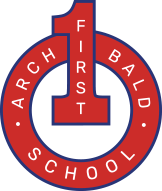English
The overarching aim of Literacy teaching at Archibald is to promote high standards of language and literacy as well as developing a love of reading. All year groups have a daily literacy session, but the inter-related skills of reading, writing and speaking and listening are taught and practised throughout the curriculum. Much of the literacy work links with the half term’s topic which makes it even more purposeful.
Key aims
- Children become fluent readers and develop secure comprehension skills
- They read widely across the curriculum for both pleasure and to find things out.
- To develop a wide vocabulary and a secure understanding of grammar.
- An appreciation of a wide variety of literature.
- To write clearly, accurately and coherently in different styles, for different purposes and audiences.
- To develop a clear and joined handwriting style by the end of Year 4.
- Pupils can explain their understanding and ideas to others through discussion, using appropriate terminology.
AFS English Curriculum Statement
IMPLEMENTATION
Writing
We use the Power of Reading approach to teach writing for a range of purposes. Teachers choose a chosen text as the stimulus for children, which they get chance to explore and immerse themselves in. A quality text may be used as the basis of learning over several weeks and children will explore and discuss the text through creative activities. This approach helps to develop inference and deduction skills and comprehension skills. It also involves children regularly writing in different genres and creates a more cohesive learning experience. Literacy is at the heart of the curriculum and the texts facilitate a range of cross curricular work. When needed, high quality intervention is implemented to support children in both catching and keeping up.
Once children are confident with their phonics, we then focus on the spelling rules and common exception words. In Key Stage One and Two teachers use dictated sentences to assess spelling. The grammar requirements for each year group are integrated into the daily literacy lessons. Our literacy lessons enable the children to slowly develop and refine the skills they need for a particular piece of writing, including working on handwriting, spelling, punctuation and grammar. Our pupils follow a clear model of ‘plan, write and edit.
AFS English Overview by Year Group
AFS English School Overview by Genre
What you can expect to see in a typical English Lesson at Archibald:
- Careful adaptation: teaching and learning will be adapted based on our knowledge of our children’s starting points and ongoing assessment. Scaffolding and support where needed to ensure every child is able to make progress towards the key objectives.
- Reading in every lesson – this could include whole class reading, paired reading or individual reading.
- A high-quality text being used as a hook to stimulate the pupils.
- Vocabulary awareness: an emphasis is placed on identifying, collecting and applying new language within lessons. This may include a focus on etymology (the history of the word) and morphology (exploring the meaning of prefixes, root words and suffixes).
- Class and group discussion will feature in each lesson, creating opportunities for speaking and listening. Pupils are encouraged to speak formally, in full sentences and to justify their ideas and responses. Teaching staff will use these opportunities to make formative assessments of the children’s comprehension. Children will be encouraged to initiate collaboration with their peers when appropriate.
- Purpose: written work will have a meaningful purpose to the children producing it. For example, opportunities to share, perform and record will be planned into sequences of lessons.
- Modelling: Teachers will use precise modelling, both of reading and writing skills, in order to ensure that children’s progress. This modelling may be as a full class or in a small group, and can be done through writing or orally.
- Skills-based reading: when teaching reading, lessons will be based on the class text and focus on a specific reading skill detailed in year group milestones, such as prediction, inference or summarising.
- Basic skills: standards of handwriting, presentation and spelling will be high and continually monitored by all teaching staff. Letter formation to be taught discretely during Phonics in Reception. Handwriting to be taught discretely using the Nelson Guide in Reception to Year 4. Spelling will link to phonics and high frequency words in EYFS, Year 1 and Year 2. spellings. In KS2, pupils complete weekly spelling tests.
IMPACT
Progress in our curriculum is measured by children knowing more and remembering more.
The impact of our teaching in English is measured through both formative and summative assessment, based on progress towards the objectives laid out in the National Curriculum. The feedback process supports teachers in accurately assessing the progress made within and across lessons. Verbal feedback is the most immediate feedback within the lesson and allows pupils and staff to recognise misconceptions and continue to progress within a lesson. Both self and peer assessment is a key skill in allowing children to become reflective and critical learners.
Each year group has a specific set of milestones for reading and writing which detail what a skill looks like at ‘working towards’, ‘expected standard’ and ‘greater depth’. These act as key performance indicators for the English Curriculum. Teachers use these, as well as the other objectives in the National Curriculum, to plan and assess the learning within their lessons. This is formally collated using ‘Sonar’ software, where gaps can be identified and analysed termly.
Find out more about reading and the teaching of phonics at Archibald…






